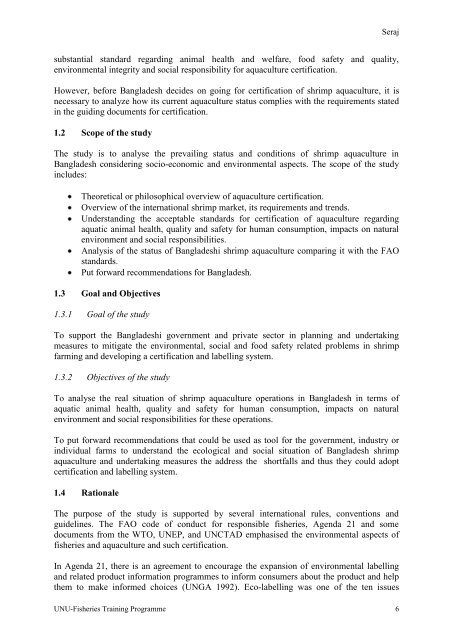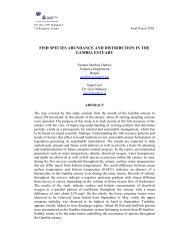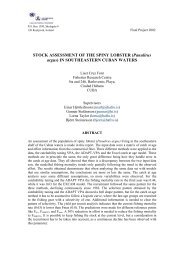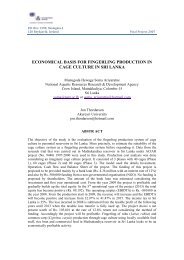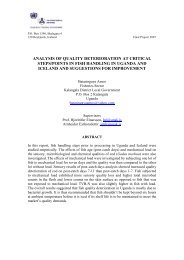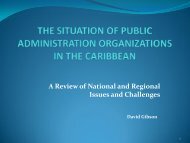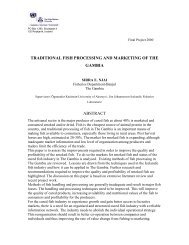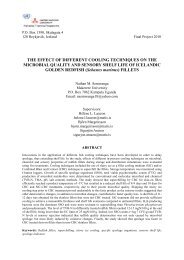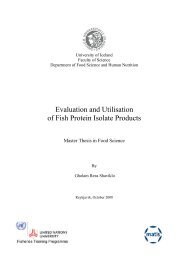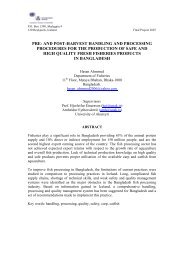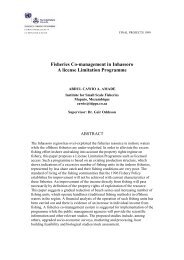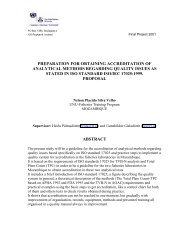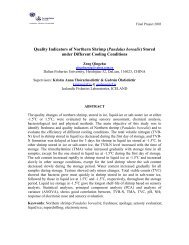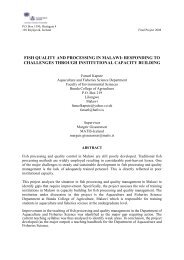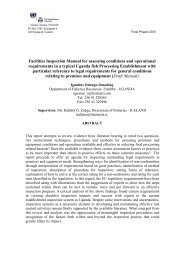a compliance study of Bangladesh shrimp aquaculture - The United ...
a compliance study of Bangladesh shrimp aquaculture - The United ...
a compliance study of Bangladesh shrimp aquaculture - The United ...
You also want an ePaper? Increase the reach of your titles
YUMPU automatically turns print PDFs into web optimized ePapers that Google loves.
Serajsubstantial standard regarding animal health and welfare, food safety and quality,environmental integrity and social responsibility for <strong>aquaculture</strong> certification.However, before <strong>Bangladesh</strong> decides on going for certification <strong>of</strong> <strong>shrimp</strong> <strong>aquaculture</strong>, it isnecessary to analyze how its current <strong>aquaculture</strong> status complies with the requirements statedin the guiding documents for certification.1.2 Scope <strong>of</strong> the <strong>study</strong><strong>The</strong> <strong>study</strong> is to analyse the prevailing status and conditions <strong>of</strong> <strong>shrimp</strong> <strong>aquaculture</strong> in<strong>Bangladesh</strong> considering socio-economic and environmental aspects. <strong>The</strong> scope <strong>of</strong> the <strong>study</strong>includes:<strong>The</strong>oretical or philosophical overview <strong>of</strong> <strong>aquaculture</strong> certification.Overview <strong>of</strong> the international <strong>shrimp</strong> market, its requirements and trends.Understanding the acceptable standards for certification <strong>of</strong> <strong>aquaculture</strong> regardingaquatic animal health, quality and safety for human consumption, impacts on naturalenvironment and social responsibilities.Analysis <strong>of</strong> the status <strong>of</strong> <strong>Bangladesh</strong>i <strong>shrimp</strong> <strong>aquaculture</strong> comparing it with the FAOstandards.Put forward recommendations for <strong>Bangladesh</strong>.1.3 Goal and Objectives1.3.1 Goal <strong>of</strong> the <strong>study</strong>To support the <strong>Bangladesh</strong>i government and private sector in planning and undertakingmeasures to mitigate the environmental, social and food safety related problems in <strong>shrimp</strong>farming and developing a certification and labelling system.1.3.2 Objectives <strong>of</strong> the <strong>study</strong>To analyse the real situation <strong>of</strong> <strong>shrimp</strong> <strong>aquaculture</strong> operations in <strong>Bangladesh</strong> in terms <strong>of</strong>aquatic animal health, quality and safety for human consumption, impacts on naturalenvironment and social responsibilities for these operations.To put forward recommendations that could be used as tool for the government, industry orindividual farms to understand the ecological and social situation <strong>of</strong> <strong>Bangladesh</strong> <strong>shrimp</strong><strong>aquaculture</strong> and undertaking measures the address the shortfalls and thus they could adoptcertification and labelling system.1.4 Rationale<strong>The</strong> purpose <strong>of</strong> the <strong>study</strong> is supported by several international rules, conventions andguidelines. <strong>The</strong> FAO code <strong>of</strong> conduct for responsible fisheries, Agenda 21 and somedocuments from the WTO, UNEP, and UNCTAD emphasised the environmental aspects <strong>of</strong>fisheries and <strong>aquaculture</strong> and such certification.In Agenda 21, there is an agreement to encourage the expansion <strong>of</strong> environmental labellingand related product information programmes to inform consumers about the product and helpthem to make informed choices (UNGA 1992). Eco-labelling was one <strong>of</strong> the ten issuesUNU-Fisheries Training Programme 6


